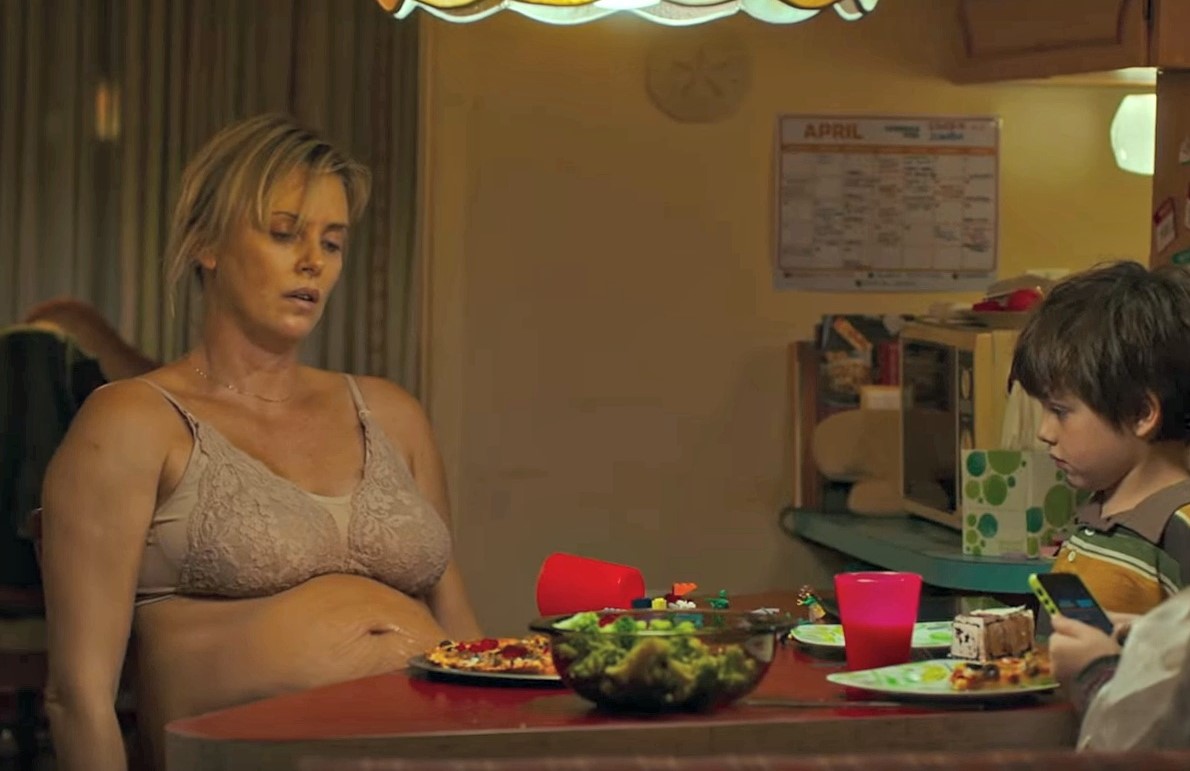I took my doula to a movie.
We saw Tully.
I expected an adult comedy, but Karen, my doula, had warned me: the birthing community wasn’t posting rave reviews about this movie.
The trailers portrayed the humor: an exhausted mom passed out on the couch while her older children play in the curtains behind her; the dad spending his time gaming; spilled breastmilk; comparing a night nanny to a lifetime movie “where the nanny tries to kill the family and the mom survives and she has to walk with a cane at the end”; Marlo, the mom, taking her shirt off at the table and her fat postpartum spilling out.
Then Tully, the night nanny, walks in. The music switches gears and rolls in with happiness and hope.
The trailer then finishes off with another joke.
So yes: I expected a comedy.
It was…not a comedy.
In fact, this movie should probably come with trigger warnings for moms because of the constant baby’s cries and spilled breast milk! Also, maybe some reassurance that postpartum mood disorders are legit; moms need a massive support group; and a night nanny is practically a godsend for any mom, whether it’s her first or eighth child!
What I watched was a movie that was better in retrospect than it was while I watched it.
What I watched was a movie about the Haves and the Have-Nots.
What I watched was a movie that either missed the boat (by miles) on addressing postpartum mood disorders — or, in a roundabout way, dropped the message in our laps that Moms who Have Not don’t know where to go and don’t have access to the resources they need to handle the immense responsibility of caring for a tiny life.
Charlize Theron plays the mom, Marlo, who looks for help from a night nanny, Tully, played by MacKenzie Davis, when her life with her third baby steamrolls her. Her husband, Drew (Ron Livingston), fumbles through, helping with homework for the older kids, but staying hands off with the baby and retreating to his video games before bedtime.
Marlo is a Have-Not. Her husband is struggling to climb his career ladder. Their home is drab and dark. She’s barely put together, and wasn’t expecting to have a third child in her life.
Marlo’s brother, Craig (Mark Duplass) and his wife, Elyse (Elaine Tan) are some of the Haves, with money wafting through the air of their designer home. Their kids eat truffle mac and cheese in a separate area of the house with their nanny. It’s this brother who “gifts” Marlo a night nanny to congratulate her on the baby’s birth. Marlo’s lifetime movie response highlighted in the trailer simply shares the opinion of a mom who thinks, “Why can’t I take care of my own offspring myself?”
Initially, the night nanny feels like a true godsend for Marlo. As I watched, I started to relax as the cries of an infant in the middle of the night faded away, and the family woke to a clean house and homemade cupcakes on the table.
Then, things get twisted and uncomfortable. I squirmed in my chair. I stared at Karen next to me. She raised her eyebrows as if to say, “See? I told ya.” The plot seemed to take a serious dive into all of the reasons the film was rated R: language, drinking, adultery, and vulgar expressions.
The truth is, being a mom is beyond hard. It’s a struggle every day with glimpses of beauty and brief sleep thrown in.
Watching Tully was a bit like this. In the midst of it all, motherhood is uncomfortable: the midnight feedings, the dirty diapers, the laundry, the lost sleep, all of the times you question if you should do it like this book says or like that book says (I threw a sleep training book across the room. Sigh.). But when it’s over, when you look back and review the movie with the information you have at the very end, you can see the pieces come together and it all makes sense. When you have the opportunity to step out of the trenches and see the good people your kids are becoming, it’s more than worth it to get through the uncomfortable times.
In our Western culture, moms are damned if they do and damned if they don’t. We are strong, independent women who can pursue a career and have children, playing the role of being everything to everyone, from the long list of “careers” that Moms do, to being the strong woman in the boardroom.
And yet, as Paulina Porizkova, a Swedish immigrant and model, writes, “The American woman is told she can do anything and then is knocked down the moment she proves it.”
Many moms have told me, “It gets better.” They’re trying to offer perspective, which can never be handed off to another person. You have to gain it yourself, but it can be so hard — not just for mom, but for the whole family.
It’s always a struggle for a family to adjust. And when a night nanny or postpartum doula comes in, their role is to support healing and bonding within that family. They come to help the parents get sleep. They come so the parents know their babies are safe.
Tully is a movie about motherhood. I walked out of the theater thinking about all of the strategies I use to embrace motherhood and take care of myself. I walked out thinking these things — the things I wish I could have taught Marlo. Things like:
- I need to talk about my struggles and NAME THEM. Hiding my hard times or skirting around the issues doesn’t benefit me or lead to getting help when needed.
- I am not ashamed of telling people that I dealt with postpartum depression and anxiety with my kids.
- It’s okay that I often question my ability to do this, to be the mom, to get through the day, or through the night, and try to give my kids stability, nourishment, safety, and love.
- I need to better thank my husband for his constant support as my partner.
- I need to ask for help because people can’t read my mind.
- I need to hold on to my identity because I want my kids to see me as a person with hobbies, likes, and dislikes. It matters to me that they see me doing things that make me feel alive.
- I am more than my body, after the physiological changes of growing, birthing, and nursing two children. And I will treat my body with love.
- My kids are part of me, walking around with some of my DNA — and leaving some of their DNA in my body, from my brain to my heart to my kidney.
Motherhood changes you, but it doesn’t erase you.
Overall, if you want to give Tully the benefit of the doubt, then I recommend seeing the movie. But just be aware — it left me feeling disappointed in how they chose to portray motherhood. You’ll get what I mean at the very end. If you walk away thinking to yourself, “Wait! They can’t just fix it like that!” then you and I will definitely agree on something.








